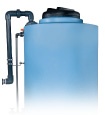When storing chemicals, it isn’t enough to select a tank material that works for a while. You need to ensure that your storage solution remains safe, reliable, and cost-effective for years to come.
Topics:
Fittings and Accessories
Proper tank filling operations directly impact your facility's safety record, product loss rates, and operational efficiency. The right fill line system does more than simply moving chemicals from delivery trucks to storage tanks. It also minimizes spill risks, protects personnel, and can significantly reduce filling time while preventing costly product waste.
Topics:
Fittings and Accessories
Selecting the right chemical storage solution can feel overwhelming, especially when safety, compliance, cost-effectiveness, and useful life are all on the line. Whether you're upgrading your existing tank infrastructure or implementing a new storage system, understanding your options will help you make an informed decision that protects both your operation and your bottom line.
Topics:
Tank Design and Materials
Proper tank design is crucial to successful and safe chemical storage. Purchasing a chemical storage tank isn't just about selecting the right size — it is vital to design the proper tank configuration for the safety of your employees, the protection of the environment, and to get the most out of your investment.
Topics:
Tank Design and Materials
Building in flood-prone areas requires careful consideration of both safety standards and insurance implications. These considerations apply not only to homes and building structures, but even to chemical storage systems.
Topics:
Tank Design and Materials
Purchasing a high-performance chemical storage tank is a significant investment for your company, and choosing the right tank for your needs isn't always an obvious decision. Whether you're considering fiberglass reinforced plastic (FRP), stainless steel, mild steel, or crosslinked polyethylene (XLPE) tanks, it's essential to understand the differences between them and to know what to expect in terms of cost, maintenance, service, delivery times, and protection.
Topics:
Tank Design and Materials
When installing a plastic storage tank, whether for water, chemicals, or other liquids, the foundation pad might seem like a simple concrete slab. However, proper pad design is critical for tank performance, longevity, and safety – and it's more complex than you might think.
Topics:
Tank Design and Materials
When it comes to chemical storage solutions, proper planning can make all the difference between a smooth project timeline and costly delays. Understanding lead times for different tank materials and manufacturers is crucial for project managers, engineers, and facility operators who need reliable chemical storage systems.
Topics:
Tank Design and Materials
Poly Processing’s SAFE-Tank® double wall tank system is a revolutionary “tank-within-a-tank” design that provides secondary containment to avoid damaging equipment or property, loss of chemicals, or injury to employees in the event of a spill. Our newest 10,500 gallon capacity expands your options for safe, reliable chemical storage.
Topics:
Tank Design and Materials
Many industrial chemical applications use mixers to create products, keep chemicals in suspension, treat wastewater, or dilute the chemical. Polyethylene tanks are well equipped to handle that type of process, as most chemicals can be safely combined.
Topics:
Fittings and Accessories



